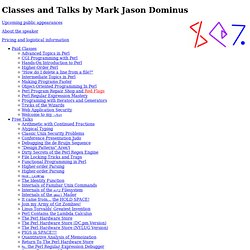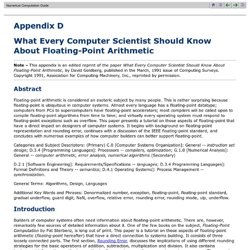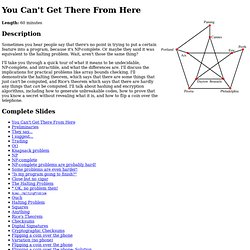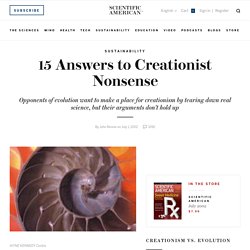

Turing. Perl Paraphernalia: Classes and Talks. Upcoming public appearances About the speaker Pricing and logistical information Paid Classes Advanced Topics in Perl (3-5 days) Advanced Topics in Perl covers the construction and operations of modules, the Exporter, Perl's namespace structure, object-oriented programming, advanced use of subroutines, exception handling, the debugger, and the Perl symbol table.

Full details are available CGI Programming with Perl (3-5 days) A comprehensive treatment of the development of applications that deliver dynamic content on the World-Wide Web. Full details are available Hands-On Introduction to Perl (2-3 days) An introduction to Perl for programmers who already have experience with other languages. Full details are available Higher-Order Perl (3 hours) (Advanced Programming Techniques for Perl) (Why Perl is Better than Those Other Languages) (Stolen Secrets of the Wizards of the Ivory Tower) Full details are available "How do I delete a line from a file?
" (Strategies for Lightweight Databases) Free Talks. What Every Computer Scientist Should Know About Floating-Point Arithmetic. This appendix is an edited reprint of the paper , by David Goldberg, published in the March, 1991 issue of Computing Surveys.

Copyright 1991, Association for Computing Machinery, Inc., reprinted by permission. Abstract Floating-point arithmetic is considered an esoteric subject by many people. This is rather surprising because floating-point is ubiquitous in computer systems. Almost every language has a floating-point datatype; computers from PCs to supercomputers have floating-point accelerators; most compilers will be called upon to compile floating-point algorithms from time to time; and virtually every operating system must respond to floating-point exceptions such as overflow. Categories and Subject Descriptors: (Primary) C.0 [Computer Systems Organization]: General -- ; D.3.4 [Programming Languages]: Processors -- ; G.1.0 [Numerical Analysis]: General -- (Secondary) General Terms: Algorithms, Design, Languages Introduction Rounding Error Floating-point Formats Relative Error and Ulps.
You Can't Get There From Here. Length: 60 minutes Description Sometimes you hear people say that there's no point in trying to put a certain feature into a program, because it's NP-complete.

Or maybe they said it was equivalent to the halting problem. Wait, aren't those the same thing? I'll take you through a quick tour of what it means to be undecidable, NP-complete, and intractible, and what the differences are. Complete Slides Return to: Universe of Discourse main page | Perl Paraphernalia | Other Classes and Talks.
Opponents of evolution want to make a place for creationism by tearing down real science, but their arguments don't hold up. When Charles Darwin introduced the theory of evolution through natural selection 143 years ago, the scientists of the day argued over it fiercely, but the massing evidence from paleontology, genetics, zoology, molecular biology and other fields gradually established evolution's truth beyond reasonable doubt.

Today that battle has been won everywhere--except in the public imagination. Embarrassingly, in the 21st century, in the most scientifically advanced nation the world has ever known, creationists can still persuade politicians, judges and ordinary citizens that evolution is a flawed, poorly supported fantasy. They lobby for creationist ideas such as "intelligent design" to be taught as alternatives to evolution in science classrooms. As this article goes to press, the Ohio Board of Education is debating whether to mandate such a change.
Some antievolutionists, such as Philip E. 1. All sciences frequently rely on indirect evidence. 2. 3. 4. 5. 6. 7. 8. 9.